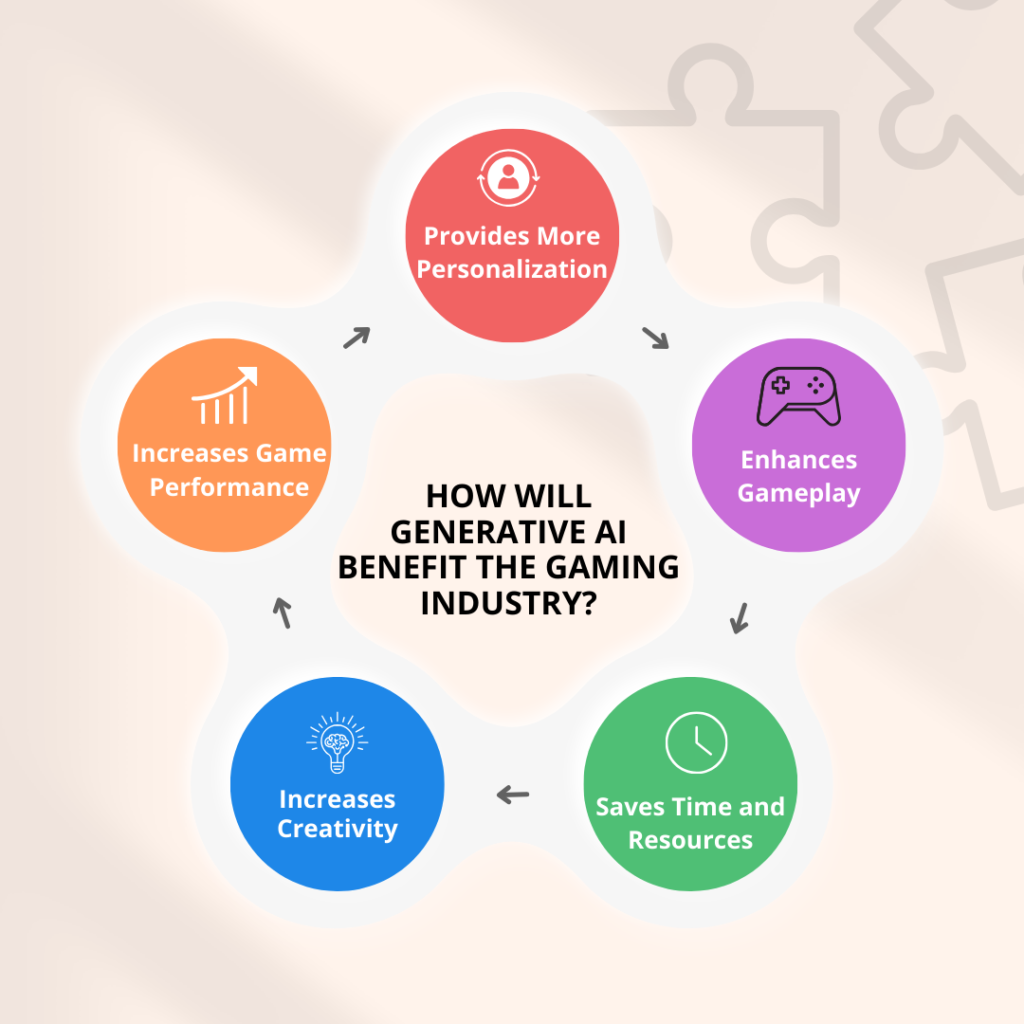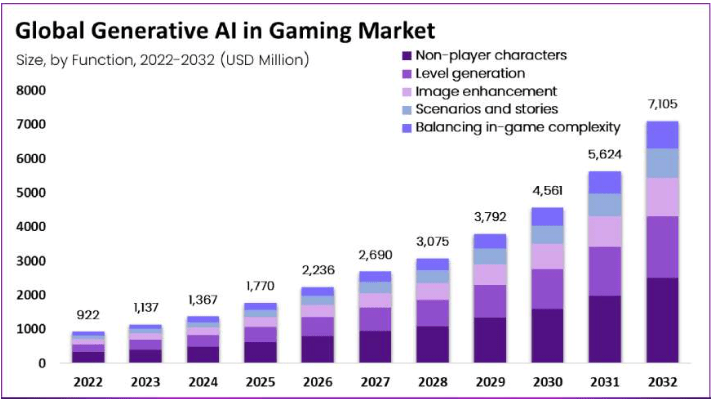The video game industry has always been at the forefront of technological advancements, constantly pushing the boundaries of what is possible in digital entertainment. In recent years, one of the most significant innovations that have taken place is generative AI in the gaming industry.
Generative AI or Gen AI, also known as procedural generation, involves using algorithms to create dynamic and ever-changing content, such as game levels, characters, and narratives.
According to Bain & Company report, nowadays gaming industry is utilizing generative AI to create content for their games. Also, in the coming years, generative AI will take up a huge space in the industry, making it easier for creators to launch a masterpiece in less time and effort. So, the big question is…!!!

What are the Benefits of Generative AI in the Gaming Industry?
Traditionally, game developers painstakingly create every aspect of their games, from the level design to the dialogue, which can be a time-consuming and costly process. However, with the advent of gen AI, developers now have a powerful tool at their disposal to automate and streamline the content creation process. This not only saves time and resources but also allows for the creation of more dynamic and engaging games.

One of the most significant ways that how Gen AI in game development has changed is in the creation of game levels. Traditionally, designing levels required substantial manual labor and artists spent countless hours crafting every detail.
However, developers can now create unique and procedurally generated levels that offer players a fresh and unpredictable experience every time they play. This not only adds replay value to games but also allows developers to create larger and more complex worlds that would be impossible to design manually.
Not only does generative AI assist with game-level design, but it also has a profound impact on character creation. In the past, creating believable and lifelike characters required animators and artists to carefully handcraft every movement and expression.
With generative AI, developers can now use algorithms that analyze facial expressions, body movements, and speech patterns to generate characters that are truly realistic and nuanced. This technology has allowed for the creation of more immersive and emotionally engaging games, where players can connect with characters on a deeper level.
Another area where generative AI in the gaming market has brought significant advancements in creating dynamic and compelling narratives. Traditionally, game narratives followed a linear path, with limited player agency and little variation in storytelling.
However, with generative AI, developers can now create branching storylines that respond to player choices and actions. This allows for more immersive and personalized gameplay experiences, where players feel like their choices truly matter and have a direct impact on the outcome of the game.
Generative AI in game development also has the potential to revolutionize the way games are developed and tested. With the ability to generate vast amounts of content automatically, developers can quickly prototype and iterate on game ideas, saving both time and costs.
Therefore, gen AI can be used to simulate and test different game scenarios and player behaviors, helping developers identify and fix potential issues before the game is released.
What Gaming Executives are talking about Generative AI?
According to Bain & Company, they surveyed 25 gaming executives to have an overview of the impact of generative AI. They found that 20% of executives believed it would reduce development and the rest 80% did not expect it can impact talent & didn’t help alleviate the shortage of talent.
However, many responders believe that it will decrease game developers’ heavy-loaded tasks but also won’t be able to eliminate creative sparkle.
A Comprehensive Forecast of Generative AI in Game Development
If this new innovative technology has the potential to comprehensively transform the gaming industry then what will be the market in coming years? Below is the forecast for Gen AI in the Gaming industry.

Use Cases of Generative AI in Gaming
The use cases of Generative AI in the gaming industry is by introducing innovative solutions that elevate game development and player experiences.
- Gen AI dynamically creates game environments, levels, and maps, reducing manual design efforts while ensuring unique experiences for each player.
- AI-powered Non-Playable Characters (NPCs) adapt their dialogues and behaviors in real-time, creating more immersive and engaging gameplay.
- Generative AI tailors narratives based on player choices, enabling personalized storylines that evolve uniquely with each decision.
- From realistic visuals to intricate soundscapes, Gen AI accelerates the creation of game assets, streamlining development processes.
- AI simulates diverse player actions to detect bugs and balance issues, ensuring smoother gameplay and higher quality at launch.
- Generative AI provides in-game assistance, offering strategies or explanations to help players navigate complex challenges.
- AI creates adaptive soundtracks and sound effects that respond to in-game events, enhancing immersion and emotional engagement.
- By analyzing player data, AI adjusts game difficulty, aesthetics, and content to match individual preferences and playstyles.
- Developers use AI to assist in generating code, designing elements, and prototyping games, enabling faster and more innovative creation.
- Generative AI balances in-game economies, ensuring fairness and maintaining stability in virtual marketplaces.
Also Read: AI in Fashion-Trends, Future, and Examples
Examples of Generative AI in the Gaming Industry
The integration of cutting-edge technologies has become a defining factor for success. One such groundbreaking innovation that has taken the industry by storm is Gen AI. Gaming companies worldwide are leveraging the capabilities of Generative AI in game development to create immersive and dynamic experiences that push the boundaries of creativity and interactivity.
Ubisoft
Ubisoft, a leading player in the gaming industry, has embraced AI to enhance procedural content generation in their games. By utilizing algorithms that dynamically generate in-game content, such as environments, levels, and even narrative elements, Ubisoft can deliver vast and diverse gaming worlds. This not only reduces development time but also ensures a more engaging and unpredictable experience for players.
Electronic Arts
Electronic Arts (EA) has been at the forefront of incorporating Gen AI into its games, particularly in the realm of adaptive artificial intelligence. Through machine learning algorithms, EA’s games can adapt to the player’s style, learning from their decisions and behaviors. This personalized gaming experience ensures that players face unique challenges tailored to their skills and preferences, adding a layer of individualization to the gaming journey.
Epic Games
Epic Games, the creators of the widely used Unreal Engine, have been actively integrating AI into their development tools. Unreal Engine’s MetaHuman Creator, powered by Gen AI, allows developers to craft incredibly realistic and diverse character models with unprecedented speed and precision. This not only streamlines the character design process but also opens up new possibilities for creating lifelike and emotionally resonant characters in games.
Square Enix
Square Enix has delved into the realm of AI-driven storytelling, using Gen AI to dynamically shape narrative experiences. By employing machine learning to analyze player choices and behaviors, Square Enix can tailor the unfolding story in real-time, offering players a more responsive and personalized narrative journey.
Final Verdict!
As we witness the continuous evolution of generative AI in gaming, it stands as a testament to the industry’s commitment to pushing creative boundaries and delivering unparalleled gaming experiences.
To know more about how gen AI is impacting other industries, head over to our blogs and also subscribe to us for quick updates.
Frequently Asked Questions (FAQs)
How does Gen AI work?
Gen AI uses machine learning models, such as neural networks, to analyze vast datasets and create content, simulations, and interactions autonomously, mimicking human creativity and decision-making.
What games use generative AI?
Games like Minecraft, No Man’s Sky, and The Sims leverage generative AI for procedural world-building, dynamic storytelling, and realistic character behavior.
Which AI tool is used in gaming?
Popular AI tools in gaming include Unity ML-Agents for machine learning, OpenAI’s GPT models for natural language processing, and procedural generation tools like Houdini for world-building.
What is the future of AI in gaming?
The future of AI in gaming lies in creating more immersive, adaptive worlds with personalized player experiences, dynamic narratives, and lifelike AI-driven characters that evolve based on player interactions.







